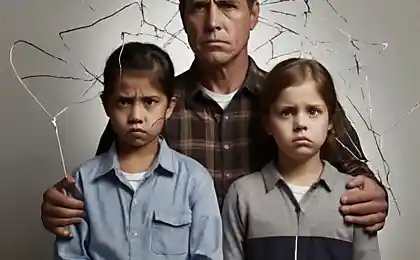425
Psychological terror: How parents humiliate children

It is very convenient when the child reacts to all prohibitions with meek obedience. This may be the perfect picture for many parents, but it often hides hidden violence that causes indelible damage to the child’s psyche. Psychological terror is a form of violence where parents, instead of supporting their child and helping him grow, use psychological methods of pressure and humiliation to suppress his will, feelings and individuality.
Psychological abuse can be as devastating as physical abuse, but its consequences often go unnoticed at first glance. Unlike physical violence, psychological terror leaves no marks on the body, but leaves deep wounds in the soul. How to recognize psychological abuse by parents? And what is important for parents to know to avoid this trap and raise a healthy, confident person? In this article, we will look at the main forms of psychological violence, their consequences and ways to deal with them.
Ecology of life: What is psychological terror?
Psychological terror is not simply cruelty or rudeness on the part of parents, but the systematic use of their power and influence to suppress the child. It can be manipulation, emotional pressure, humiliation or even ignoring the needs of the child. Unlike conventional punishments, which can be aimed at learning or correcting behavior, psychological terror creates an atmosphere of fear and helplessness, where the child does not feel safe.
Methods of psychological terror can be different, but in general they are aimed at suppressing the self-esteem of the child and his ability to express his feelings and needs. Often the parent, without realizing it, uses such methods of upbringing as humiliation, manipulation, constant criticism or, conversely, excessive care and control, creating in the child the feeling that he will never be able to meet the expectations of the parents.
How parents can humiliate children: 5 forms of psychological terror
1. Constant criticism and humiliation
One of the most destructive methods of psychological abuse is constant criticism and humiliation. Parents, without noticing it, may too often criticize their child for his appearance, behavior or achievements. They may use phrases like “You’re worthless,” “You can’t do that,” “You’re a loser.” Such words not only undermine the child’s self-confidence, but also form a feeling that he is not worthy of love and respect.
The emotional pain of humiliation often stays with the child for life. An adult who has experienced humiliation in childhood can struggle for a long time with low self-esteem, fear of failure and the inability to build healthy relationships with others. It can also lead to depression and emotional distress.
2. Manipulation and emotional pressure
Manipulation and emotional pressure is another way to make a child feel guilty or obey the will of their parents. Parents may use phrases such as “If you love me, you’ll do it for me” or “I wouldn’t survive if you....” Such manipulations make the child feel that his value is determined only by how he pleases his parents.
Children brought up in an atmosphere of manipulation often begin to doubt their feelings and desires, because they always adjust to other people's expectations. This leads to internal conflict, and the child can grow up a person who does not know how to defend their interests and becomes dependent on the opinions of others.
3. Ignorance and emotional withdrawal
One of the most painful and hidden ways of humiliation is to emotionally detach or ignore a child’s needs. Parents may not pay attention to their feelings, needs or problems, showing that they are not important. This can be manifested in the form of a lack of support, refusal to communicate, or even complete disregard for the child when he needs help.
Ignoring a child can be just as painful as direct abuse because it doesn’t leave the child with the opportunity to develop healthy relationships. An adult who has experienced emotional detachment in childhood may have difficulty establishing trusting relationships in the future, be afraid to openly express their feelings, or even avoid communicating with loved ones.
4. Over-control and hyper-guardianship
Overprotection is another form of control that may seem like care, but is actually a method of suppressing a child’s independence. Parents who are in constant control of every aspect of their child’s life, from who they interact with to what they eat and wear, deprive them of the opportunity to learn how to make their own decisions.
Children who grew up in an atmosphere of overprotection often have problems with accepting responsibility, developing self-confidence and independence. They may be afraid to make a choice or make a decision because they do not believe in their ability to cope with the consequences.
5. Lack of support and heat
Parents who do not express their love and support cause the child no less serious harm. When a child does not feel loved and supported, he begins to doubt his own worth. This can manifest itself in coldness, indifference or even a direct refusal to show love.
Children who grew up in such conditions can become adults who do not know how to express their feelings and do not know how to build trusting and warm relationships. They may have problems with self-acceptance and emotional intimacy in relationships with others.
Consequences of psychological terror
The consequences of psychological terror can be profoundly destructive and last for a long time. Low self-esteem, trust problems, emotional isolation, inability to express themselves, and chronic guilt are all consequences that children who grow up in toxic parenting experience.
It is important to understand that these consequences can last for years and affect a person’s personal life and career. Recognizing the problem and seeking help are the first steps to recovery. It is important to create an atmosphere for children where they feel love, respect and support, and teach them to be independent and confident.
Conclusion
Psychological terror is a form of violence that leaves deep and lasting traces on a child’s life. Parents who use manipulation, humiliation, or excessive control create a misconception about love and respect. To avoid these consequences, it is important for parents to develop awareness and build healthy relationships with children based on respect, support and honesty.
Children of narcissists: 6 consequences of toxic parenting
8 Signs That It’s Time to End a Friendship (According to Psychologists)























